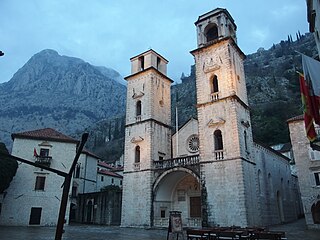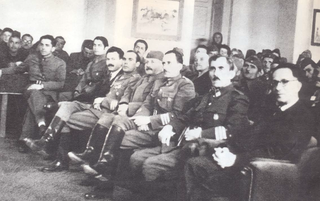Related Research Articles

Mojkovac Municipality is one of the municipalities of Montenegro. The municipality is located in northern Montenegro. The administrative center of the municipality is the town of Mojkovac.

Eastern Orthodox Christianity is largest religion in Montenegro, but there are also sizeable numbers of adherents of both Catholic Christianity and Islam.
Prof. Šerbo Rastoder, PhD is a Montenegrin historian of Bosniak ethnicity. He is also an author, writing about the history of Montenegro and about a few specific parts in Montenegro's history. He is a member of the Doclean Academy of Sciences and Arts, Bosniak Academy of Sciences and Arts and Montenegrin Academy of Sciences and Arts. In 2017, he signed the Declaration on the Common Language of the Croats, Serbs, Bosniaks and Montenegrins.

The State Anti-fascist Council for the National Liberation of Montenegro and Boka was formed as the highest governing institution of the anti-fascist resistance movement in Montenegro, in the former Kingdom of Yugoslavia.

The Croats have a minority in Boka Kotorska, a coastal region in Montenegro, the largest of their kind in Tivat. The three municipalities making up the Bay of Kotor include 4,519 Croats or 6.70%. They are also known as Bokelji, a common name for all inhabitants for of Boka Kotorska. Tivat is home to the minority political party Croatian Civic Initiative, and to the National Council of Croats in Montenegro. Kotor is home to Croatian Civic Society of Montenegro.

The Montenegrin Federalist Party, sometimes known simply as the Montenegrin Party, was a Montenegrin political party in the Kingdom of Yugoslavia which stood for preservation of Montenegrin autonomy and a decentralized federalised Yugoslavia. It pursued the ideology of the Greens who lost the Christmas Uprising, but in a peaceful and democratic manner. Its best known leader was Sekula Drljević.

Novica Radović was a Montenegrin politician.

Andrija Mandić is a Montenegrin politician serving as the president of the Parliament of Montenegro since 30 October 2023 and eight-term member of the Parliament. He is the president of the right-wing New Serb Democracy. He was the head of the Democratic Front parliamentary club in the parliament until 2020.

The M-2 highway is a Montenegrin roadway.

M-3 highway is a Montenegrin roadway. It runs concurrently with European route E762.

Democratic Montenegro, also known as the Democrats, is a conservative liberal, centrist, populist and pro-European political party in Montenegro. Democrats currently has nine MPs in the Parliament of Montenegro, elected in 2020, from the big tent Peace is Our Nation (MNN) electoral list. Its founder and current leader is Aleksa Bečić, former President of the Parliament.

M-1 highway is a Montenegrin roadway.

M-4 highway is a Montenegrin roadway. It runs concurrently with European route E762.

M-5 highway is a Montenegrin roadway.

In late December 2019, a wave of protests started against the controversial, newly adopted "Law on Freedom of Religion or Belief and the Legal Status of Religious Communities" which effectively transferred ownership of church buildings and estates built before 1918 from the Serbian Orthodox Church in Montenegro to the Montenegrin state. The Serbian Orthodox Church in Montenegro, which owned 66 mainly medieval monasteries, dozens of churches and other real estate there, insisted the state wanted to impound its assets, while Pro-Western Montenegro's president Milo Đukanović, accused the Serbian church of promoting pro-Serb policies that are aimed at "undermining Montenegrin statehood".
The COVID-19 pandemic in Montenegro has resulted in 251,280 confirmed cases of COVID-19 and 2,654 deaths.
Events of 2020 in Montenegro.
Anti-Montenegrin sentiment is a generally negative view of Montenegrins as an ethnic group, commonly involving denial of the Montenegrin ethnicity and language, and negative feelings towards Montenegro. It is present in right-wing discourse in Montenegro and the ex-Yugoslavia region, mainly Serbia, and dates back to the 19th and 20th century.
References
- ↑ "U Crnoj Gori 400 masona". CdM.me. Retrieved 2015-03-02.
- ↑ "Veliki majstor Velike lože Crne Gore: Ima nas dovoljno da čuvamo prave vrijednosti". Vijesti.me. Retrieved 2013-06-16.
- ↑ "Božo Šibalić novi Veliki majstor Velike lože Crne Gore". PortalAnalitika.me. Retrieved 2017-10-02.
- ↑ "Masoni prisvajaju Njegoša i luču Mikrokozmu". Sedmica.me. Retrieved 2017-04-04.
- ↑ "U Crnoj Gori 400 masona". CdM.me. Retrieved 2015-03-02.